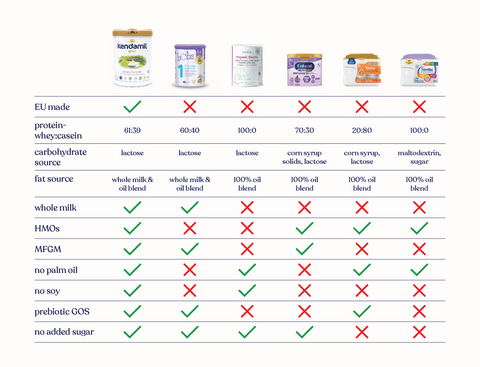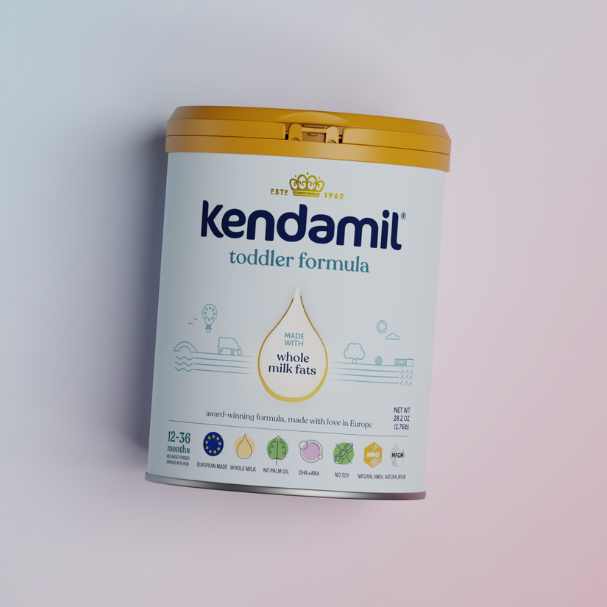Babies start life with an immature digestive system, so it’s quite common at some point for your baby to experience some digestive issues such as colic, reflux, gas, constipation and spit-up. As they develop and grow stronger most babies grow out of these issues, but for those with sensitive tums a more gentle formula may be the solution.
There are many sensitive baby formulas available to choose from, as well as a more natural gentle alternative for sensitive tummies, goat formula. In this article we will delve into the contents of sensitive baby formulas to see how a goat milk based formula might be a gentle alternative that is closer to breast milk vs sensitive formula. a more natural alternative.
Why are families choosing sensitive formulas?
Did you know that 6 in 10 parents use sensitive, gentle, or lactose-reduced infant formulas for their babies? (1) So let’s get into why?
Many babies will suffer from digestive issues between the ages of 0-6 months. Reflux affects around 70-85% of infants and colic affects around 5-40% of babies globally. Some parents may also find their babies to be fussy, gassy and cry more than usual. If an underlying health concern has been ruled out as well as a food allergy or intolerance such as CMPA, then most babies do eventually grow out of these common digestive problems. But for babies struggling with digestive issues and sensitive tummies an alternative formula that is easier for them to digest can often help to relieve these problems.
Most sensitive formulas will contain partially hydrolyzed proteins, instead of intact proteins, some also have lower lactose content by adding carbohydrate alternatives that are not found in breast milk, such as syrups and dextrin. The partially hydrolyzed proteins can make it easier for baby to digest and probiotics can help aid digestion. A study from 2021 showed that this type of formula recipe may be of benefit to some infants suffering with gastrointestinal disorders. The results from the study did show that the infants had decreased vomiting, flatulence and crying.
How Is Kendamil Goat Formula Naturally Closer To Breast Milk?
For babies with sensitive tummies, who are suffering with common digestive issues such as colic, reflux, spit-up and constipation, Kendamil’s Goat Infant Formula could be a more natural alternative to choosing a sensitive formula, which tends to be more processed. Let’s dig into the reasons why you may want to consider goat milk:
Gentle And Speciality Formulas Are More Processed
Gentle formulas are usually made of partially hydrolyzed proteins or extensively hydrolyzed proteins so that the proteins are a similar size to breast milk and easier to digest. Kendamil’s Goat Infant Formula predominantly contains A2 beta-casein proteins naturally, which are similar to the proteins found in breast milk and may be easier to digest for sensitive babies.
For infants experiencing digestive discomfort such as constipation, gassiness and reflux, using goat milk formula, may reduce the likelihood of these symptoms occurring, making it a natural alternative for infants with sensitive tummies.
Oil vs Whole Milk
Most sensitive formula brands are using a 100% oil blend instead of using nutrient rich whole milk. A few of them are also still using palm oil which has been shown to cause constipation in some infants and can also prevent the absorption of good fats and prevent the absorption of important minerals like calcium.
Kendamil’s Goat Infant Formula contains whole goat’s milk so you have all the nutritional benefits of whole milk, but as goat milk is closer to breast milk it is easier to digest without needing to be overly processed like the sensitive formulas. Using whole milk also means more of the fats that your baby will be consuming will come from natural goat milk fats, so less from vegetable oils, whereas from the current sensitive formulas available your baby’s sole fat source will be from vegetable oils only - no milk fat. By using whole milk our Goat Infant Formula contains naturally occurring Milk Fat Globule Membranes (MFGM), which is uniquely found in mammalian milk, including breast milk. Research has shown the potential benefits of MFGM for infants including better cognitive development, reduced risk of infection and positive influence on gut health. Sensitive formulas usually add synthetic MFGM.
Taste Is Important
Because sensitive formula recipes contain partially or extensively hydrolyzed proteins, often this can mean the formula itself tastes and smells less appealing than standard formula. Some sensitive formula brands are also adding sugar to increase palatability.
Because we use whole milk in our Goat Infant Formula it gives our formula a natural creamy texture and richer flavor.
Corn Syrup vs Lactose
Lactose and corn syrup are two common ingredients used in baby formula. Lactose is a natural sugar found in milk, including breast milk, while corn syrup is a processed sweetener made from corn starch. Lactose is easily digested by most babies and provides them with the energy they need to grow and develop. It also helps to promote the growth of beneficial bacteria in the gut and supports the absorption of calcium and other minerals. If your baby does not need a specialty formula due to an allergy or diagnosed intolerance, the advantages of a formula with lactose as the sole carbohydrate source, like in Kendamil Goat, outweigh the advantages of using a formula containing corn syrup. That’s because corn syrup is a highly processed sweetener with a high glycemic index, which can cause a rapid spike in blood sugar levels. Maltodextrin is not as easily digested as lactose either and may not provide the same nutritional benefits. To learn more about the carbs in your baby’s formula head to our blog: Not All Carbs Are Equal.
Let’s Compare
As you can see from the chart below Kendamil’s Goat Infant Formula is made with whole goat milk containing naturally occurring MFGM and HMOs, it has lactose as its main source of carbohydrate and includes prebiotic GOS and does not contain palm oil. For more information on how goat milk can be a gentle alternative for sensitive tummies check out our blog here.

As you have seen, although sensitive formulas can be beneficial for babies with sensitive tummies, there is a more natural, less processed, alternative: our goat formula.
If you are concerned that your child may have an allergy or intolerance you should always consult your pediatrician before switching formulas. If we’ve peaked your curiosity on goat infant formula, then you can learn more about Kendamil’s Goat Infant Formula and its benefits for sensitive tummies here.
- Strzalkowski et al. Protein and carbohydrate content of infant formula purchased in the United States, 2022














